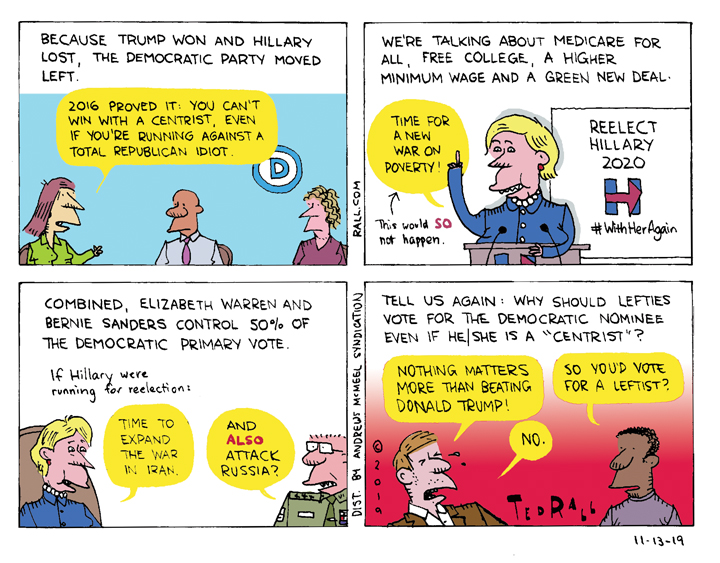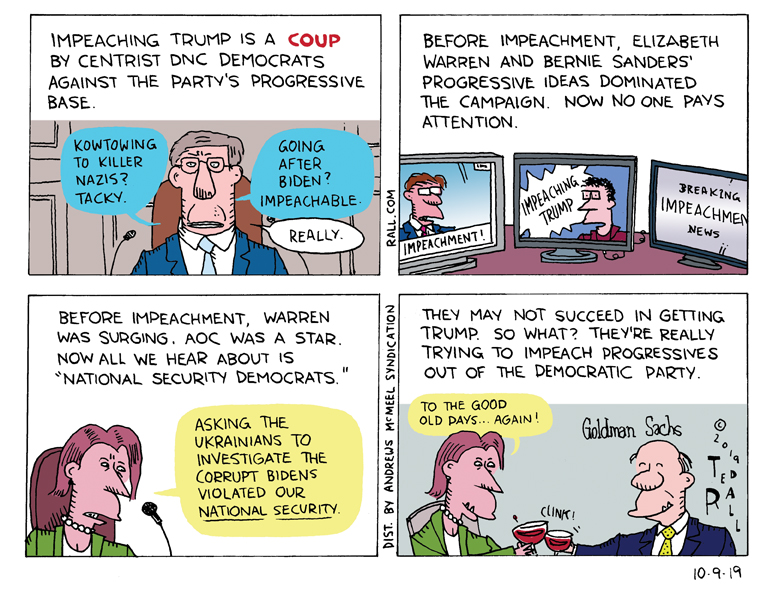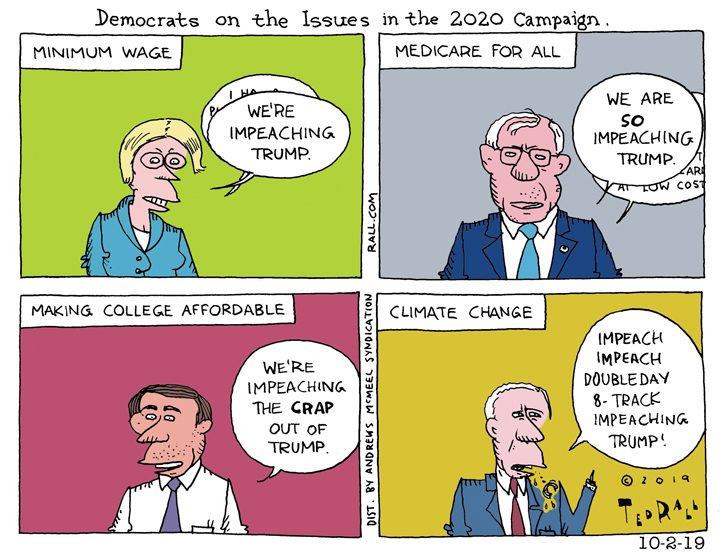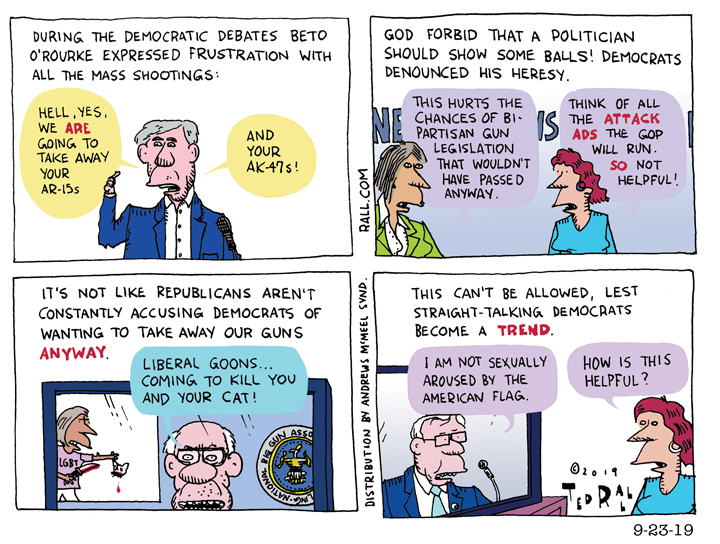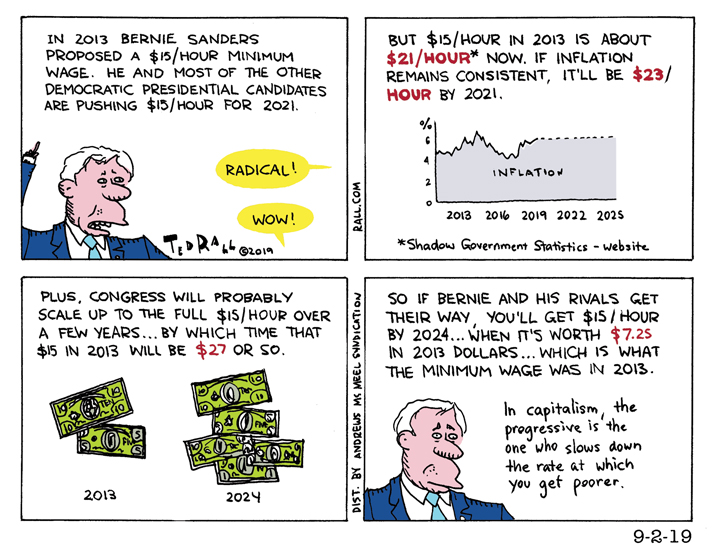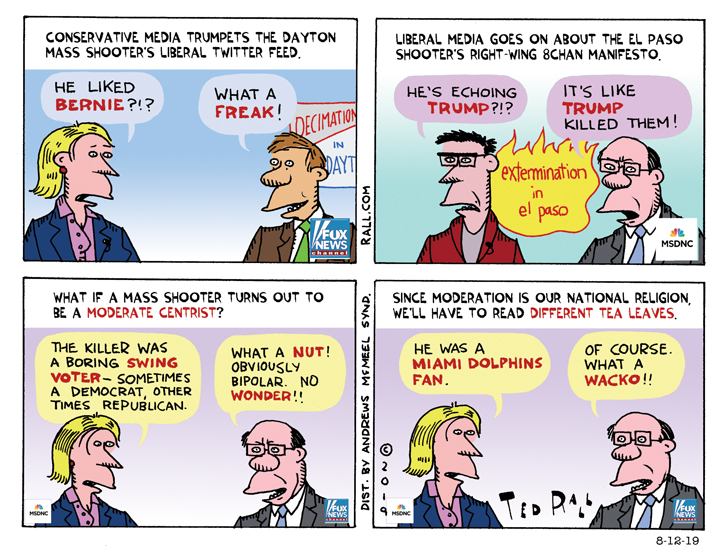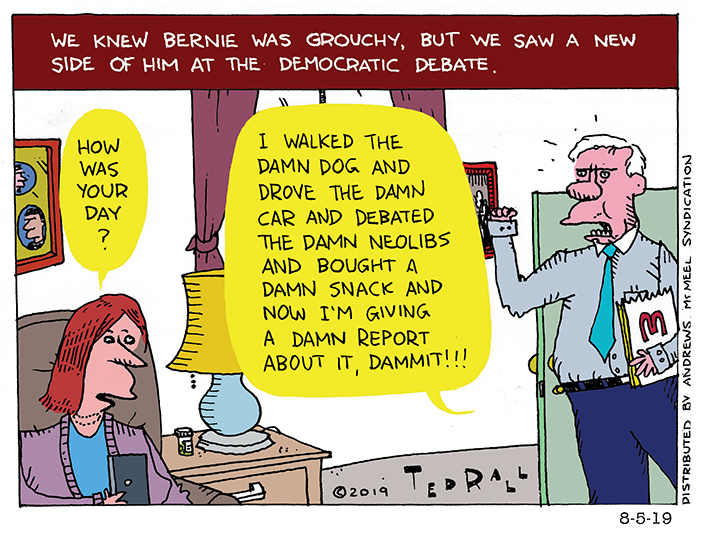Democratic centrists say nothing is more important than defeating Donald Trump. That’s their argument, again, for why progressives should support a centrist Democratic nominee. But it’s not like progressives suffered when Hillary Clinton lost or that they would be better off if Hillary Clinton were running for reelection today.
For Progressives, Capturing the Democratic Party is More Important Than Beating Donald Trump kik
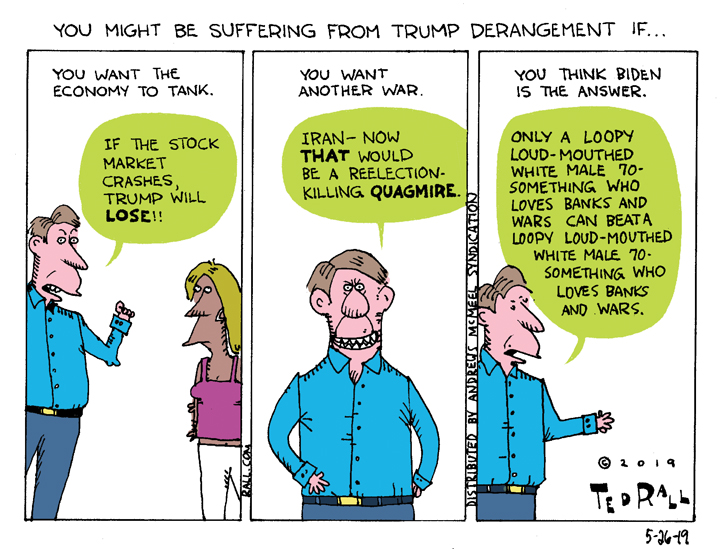
Nothing, leading Democrats say, matters more than beating Donald Trump. 2020, they argue, is the most important election of our lifetimes (OK, they always say that).
It’s not true. If you’re a progressive voter, taking back control of the Democratic Party from the DLC-Clinton-Biden centrist cabal is more important than defeating the incumbent.
For four long decades progressives—Americans who put people before profits—have been living in the political wilderness. Progressives account for 72% of Democratic voters. Figuring lefties had nowhere else to go, party leadership took them for granted, ignoring their desire for a stronger social safety net and fewer military adventures in favor of a pro-corporate agenda. What other choice did they have, vote Republican?
People who often didn’t vote turned out for Bernie Sanders’ 2016 primary campaign, proving that many non-voters weren’t apathetic. They were disgusted. After the DNC got caught pulling their usual dirty tricks, however, sabotaging Sanders in favor of Hillary Clinton, enough Bernie-or-Busters boycotted the November general election or cast protest votes for Trump to cost her the election.
Look at what happened! Progressives scored their first major win since the War on Poverty of the 1960s.
Yes, Trump has been a disaster. He is a terrible president, an international embarrassment, insane, brazenly corrupt, overtly racist, with over-the-top authoritarian tendencies.
But consider the alternative.
If Hillary Clinton were running for reelection, progressivism would still be on the outs. Like Obama, Hillary wouldn’t have appointed a single liberal, much less progressive, to her cabinet. She’s so far to the right of Trump on foreign policy that she might have gone to war against Iran. Russian national security analysts concluded that Clinton was crazy enough to start World War III. She’s equally awful on domestic stuff. Hillary is against any increase in the minimum wage. She opposes Medicare For All. She hates the Green New Deal. Her bankster backers would be running wild.
Because progressives withheld their votes in 2016, Bernie Sanders and Elizabeth Warren are the Democratic frontrunners, enjoying the combined support of 50% of primary voters. Both support a $15 minimum wage, Medicare For All, free college tuition and the Green New Deal. There is no way, no how, that those policy positions would be part of a Clinton 2020 campaign.
Progressives are so close to seizing control of the Democratic Party that they can taste it. Why, at mile 25 of this political marathon, should they let up on the pressure? They’re about to win!
If Bernie Sanders is the nominee, supporting him is a no-brainer for progressives. He’s been one of them forever. He’s trustworthy. (It’s a different calculus for leftists like me. Among other things, he needs to swear off militarism.) Progressives will vote for him.
Warren’s bonafides are squishy. She used to be a Republican, endorses capitalism and keeps Hillary on her speed dial. Is she a prog-come-lately or another fauxgressive who would sell out to Goldman Sachs? She would have to come up with some way to reassure voters that she’s more Sanders than Clinton.
But what if the DNC shoves Joe Biden or another centrist/moderate/corporatist down our throats again? As usual they’ll say that we have to pull together behind some turd in order to defeat the dastardly Donald Trump. But why?
History is clear. Lame-duck presidents don’t get big laws, new wars or much in the way of policy accomplished during their second terms. Nixon had Watergate, Reagan was hobbled by dementia and Iran Contra, Clinton was impeached because of Monica and the second Bush spent his last four years in the quagmires of Iraq and then the bursting of the subprime mortgage meltdown. Obama avoided scandal but an intransigent Republican Congress left him with little to show for years five through eight.
By 2021 Trump will almost certainly have already been impeached. Congress will probably still be Democratic. I ask my fellow Trump-haters: what exactly are you so afraid of in a second term? What do you think the president can do in a second term that he hasn’t already done? Does he strike you as the kind of person who has been plotting some big right-wing surprise to unleash in case he wins reelection?
Forget the Supreme Court-is-everything argument. As Obama proved when he refused to push for Merrick Garland, Democrats don’t move the needle. Anyway, it’s a right-wing court now. Write that sucker off.
There is a nightmare scenario: Trump dies early on. Mike Pence has three years to establish himself before running in 2024. That would really and truly suck. That is a real risk. But is fear of a Pence planet powerful enough to go back to letting the centrist scum take progressives’ votes for granted?
If the DNC robs Warren or Sanders in favor of Biden or whomever or Hillary again, Democratic progressives have little to lose by boycotting the general election again. It may be that the corporatists need to be taught the same bitter lesson a second time: without progressives there is no Democratic Party.
(Ted Rall (Twitter: @tedrall), the political cartoonist, columnist and graphic novelist, is the author of “Francis: The People’s Pope.” You can support Ted’s hard-hitting political cartoons and columns and see his work first by sponsoring his work on Patreon.)
The Impeachment of Trump is a Coup d’Etat by DNC Centrists Again
Democrats would like to think that they are all united around the goal of impeaching Donald Trump. But when you scratch the surface what you find is that the impeachment of Donald Trump is less about getting rid of a sitting president and more about regaining control of the Democratic Party from the insurgent progressives who have taken it over since Bernie Sanders.
Democrats on the Issue(s) in the 2020 Campaign
Democrats were poised to wage a substantial campaign based on the issues against Donald Trump next year. The likely front runner at this point, Elizabeth Warren, has a plan for everything. These are issues that most working Americans care about, like the minimum wage and healthcare. But now that they’ve decided to impeach Trump, the odds of those issues getting any serious play have all but evaporated.
God Forbid a Democrat Should Have Any Balls
During the Democratic Debates Beto O’Rourke reacted to a mass shooting in his hometown of El Paso by calling for the abolition and confiscation of assault rifles like the AR-15 and AK-47. Now Democrats are freaking out that Republicans might accuse them of wanting to take away people’s guns, which of course they’re going to say anyway.
Left, Center and Right: We’re All in Denial About Climate Change
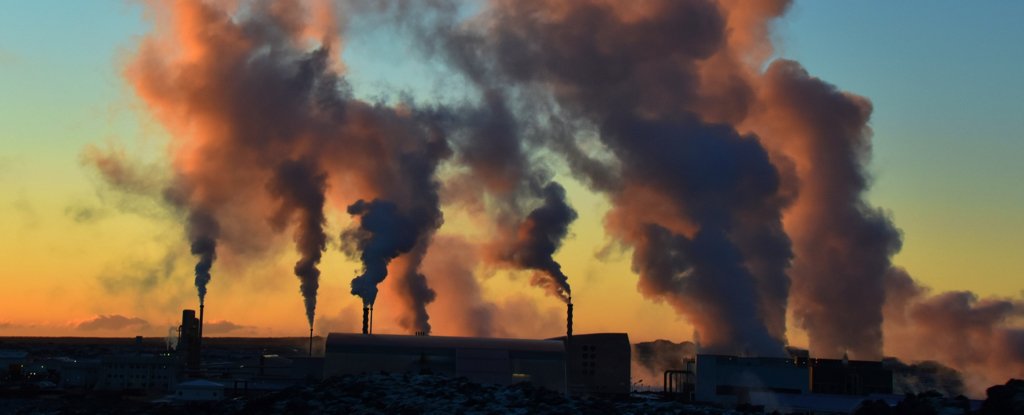 The political left, center and right do share something in common in today’s polarized America: we’re all in denial. The first step in 12-step programs begins with admitting that you have a problem for a reason: you can’t tackle a challenge whose existence you refuse to acknowledge. “From a psychoanalytical viewpoint, denial is a pathological, ineffective defense mechanism,” doctors M.S. Vos and J.C. de Haes observed in their 2006 study of cancer patients. A stunning 47% of the patients they polled denied that they had cancer! Denial reduced their chances of seeking treatment and then following through.
The political left, center and right do share something in common in today’s polarized America: we’re all in denial. The first step in 12-step programs begins with admitting that you have a problem for a reason: you can’t tackle a challenge whose existence you refuse to acknowledge. “From a psychoanalytical viewpoint, denial is a pathological, ineffective defense mechanism,” doctors M.S. Vos and J.C. de Haes observed in their 2006 study of cancer patients. A stunning 47% of the patients they polled denied that they had cancer! Denial reduced their chances of seeking treatment and then following through.
“On the other hand,” Vos and de Haes observed, “according to the stress and coping model, denial can be seen as an adaptive strategy to protect against overwhelming events and feelings.” Denial lets you feel better.
We think of climate change denial as a right-wing phenomenon. Indeed, only 56% of Republicans accept the scientific consensus that the earth is heating up; fewer still believe that humans are responsible, compared to 92% of Democrats who agree with scientists.
Those who deny that climate change is real are engaging in what psychologists call “simple denial.” But those on the left aren’t much better. Liberals who think global warming is real often resort to “transference denial”: they blame the right and corporate polluters even though we’re all responsible. The scale of the climate crisis and the level of sacrifice and disruption that would be necessary to mitigate it feels overwhelming. A widely-reported analysis predicted that human civilization will collapse in 30 years. Others say it’s already too late to save ourselves.
“We’re doomed,” predicts Mayer Hillman, a senior fellow emeritus at University of Westminster’s Policy Studies Institute. “The outcome is death, and it’s the end of most life on the planet because we’re so dependent on the burning of fossil fuels. There are no means of reversing the process which is melting the polar ice caps. And very few appear to be prepared to say so.”
He’s probably right.
Bernie Sanders recently proposed the most ambitious assault on greenhouse gas emissions ever floated in U.S. politics, a $16.3 trillion plan to transition out of carbon-based fuels by 2050. By that time, though, we’ll be dead.
As aggressive as Sanders’ plan is, it doesn’t go nearly far enough or fast enough. Yet Republicans and some Democrats say it’s too expensive. No one in corporate media is taking Sanders’ idea seriously. It’s stillborn.
Liberals post their concern to social media. Some even attend protest marches. But they’re hardly acting like we face an existential crisis.
The 16-year-old Swedish climate activist Greta Thunberg told world leaders: “I don’t want you to be hopeful, I want you to panic. I want you to feel the fear I feel every day and then I want you to act.”
Panic? Our “leaders” don’t give a crap. They’re too bought and too stupid to act.
The bird population in the U.S. has collapsed by 29%—a total of 2.9 billion fewer birds—over the last 50 years. During that same period we lost half the world’s fish. Insects are on the way out too. “No insects equals no food, [which] equals no people,” says Dino Martins, an entomologist at Kenya’s Mpala Research Centre.
None of this should come as a surprise. We were warned. “The oceans are in danger of dying,” Jacques Cousteau said in 1970. Life in the oceans had diminished by 40 percent in the previous 20 years.
If you really believe that the planet is becoming uninhabitable, if you think you are about to die, you don’t march peacefully through the streets holding signs and chanting slogans begging the corrupt scoundrels who haven’t done a damn thing for decades to wake up and do something. You identify the politicians and corporate leaders who are killing us, you track them down and you use whatever force is necessary to make them stop. Nothing less than regime change stands a chance of doing the job.
Nothing else—the struggle for income equality, gun control, abortion—matters as much as attacking pollution and climate change.
Anything short of revolution and the abolition of consumer capitalism is “minimizational denial“: admitting the problem while downplaying its severity. Anything short of a radical retooling of the global political system that establishes state control of the economy with environmental impact as our first, second and third priorities is a waste of time that dooms the human race to extinction.
There is no middle ground, no splitting the difference, no compromise. “Good enough” isn’t good enough. Mere progress won’t cut it. Human survival is a pass-fail class. The final exam is tomorrow morning—early tomorrow morning.
Time to get serious, godammit.
(Ted Rall (Twitter: @tedrall), the political cartoonist, columnist and graphic novelist, is the author of “Francis: The People’s Pope.” You can support Ted’s hard-hitting political cartoons and columns and see his work first by sponsoring his work on Patreon.)
Will Clinton Democrats Vote for a Progressive Against Trump?
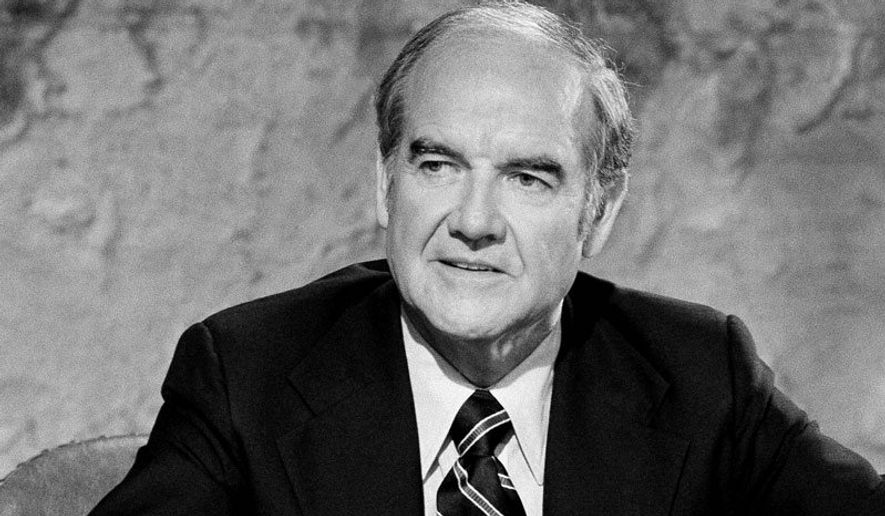 The campaign for the 2020 Democratic presidential nomination appears to be an exception. Once again the contest appears to be coming down to a choice between a “centrist” establishmentarian corporatist with institutional backing (Joe Biden) and a left-leaning populist progressive (Elizabeth Warren or Bernie Sanders) preferred by Democrats, of whom three out of four voters self-identify as progressives. In 2016 the DNC smooshed their thumbs all over the scale, brazenly cheating the insurgent progressive Bernie Sanders so they could install their preferred choice, the right-leaning Hillary Clinton. They won the battle but lost the war. Fewer than 80% of Democrats who supported Bernie in the primaries voted for Hillary in the general election. Disgruntled progressive voters—especially those who sat at home on election day—cost her the race.
The campaign for the 2020 Democratic presidential nomination appears to be an exception. Once again the contest appears to be coming down to a choice between a “centrist” establishmentarian corporatist with institutional backing (Joe Biden) and a left-leaning populist progressive (Elizabeth Warren or Bernie Sanders) preferred by Democrats, of whom three out of four voters self-identify as progressives. In 2016 the DNC smooshed their thumbs all over the scale, brazenly cheating the insurgent progressive Bernie Sanders so they could install their preferred choice, the right-leaning Hillary Clinton. They won the battle but lost the war. Fewer than 80% of Democrats who supported Bernie in the primaries voted for Hillary in the general election. Disgruntled progressive voters—especially those who sat at home on election day—cost her the race.
Who’s to blame for President Trump? Democrats have been arguing about this ever since.
Centrists call Bernie’s backers sore losers and say leftists are untrustworthy supporters of a man who never officially declared fealty to the Democratic Party, and myopic beyond understanding. Why didn’t progressives understand that nothing was more important than defeating the clear and present danger to the republic represented by Donald Trump?
Progressives counter that after decades of dutifully falling in line after their candidates fell to primary-time centrist-favoring chicanery—Ted Kennedy to a sleazy last-minute change in delegate rules, Howard Dean to a media-engineered audio smear, John Edwards to censorship—the party’s sabotage of Bernie was one crushed leftie dream too far. Democrats, progressives say, had to be taught a lesson. The left isn’t a wing, it’s the base. Anyway, who’s to say that Trump is so much worse than Hillary would have been? At least Trump doesn’t seem to share her lust for war.
The fight for the Democratic Party matters because it informs dynamics as well as the strategic logic of the current primary clash. At this writing pollsters are calling it a three-way race between Biden, Warren and Sanders, but this campaign is really a repeat of 2016: Biden vs. {Warren or Sanders}.
(If Warren or Sanders drops out it’s a safe bet that the surviving progressive receives the exiting contestant’s endorsement and his or her voters.)
Democrats tell pollsters they care about electability, i.e. choosing a candidate with a strong chance of defeating Trump. But who is that, Biden or Warren/Sanders?
In current theoretical head-to-head matchup polls, Biden beats Trump by 12 points, Warren wins by 5 and Sanders bests the president by 7. But it’s a long way to November 2020. At this point these numbers are meaningless except to say that there’s a credible case for any of the top three as viable challengers to Trump.
2016 clearly illustrates the risk of nominating Biden: progressives probably won’t vote for him. Some might even defect to Trump, as did a substantial number of Bernie voters in 2016.
If anything, Biden is even less appealing to the progressive base than Hillary was. Clinton offered the history-making potential of a first woman president and a sharp mind; Biden is another old white man, one whose repeated verbal stumbles are prompting pundits to wonder aloud whether he is suffering from dementia. Assuming he survives another 14 months without winding up in memory care, Biden will probably lose to Trump.
If Biden secures the nomination, centrists will again argue that nothing matters more than beating Trump. I see no sign that progressives will agree.
The real question is one that no one is asking: what if Warren or Sanders gets the nod? Will centrists honor their “blue no matter who” slogan if the shoe is finally on the other foot and the Democratic nominee hails from the left flank of the party?
There isn’t enough data to say one way or the other.
The party’s silent war on Bernie Sanders broke out into the open earlier this year. “I believe a gay Midwestern mayor can beat Trump. I believe an African-American senator can beat Trump. I believe a western governor, a female senator, a member of Congress, a Latino Texan or a former vice president can beat Trump,” said Jon Cowan, president of then right-wing Democratic organization Third Way, said in June. “But I don’t believe a self-described democratic socialist can win.” On the other hand, he is the “second choice” of most Biden supporters.
As Sanders stalls at the 20% mark, self-described capitalist Elizabeth Warren continues to receive more media coverage and thus increasing popular support. But would Bidenites show up for her in November? No one knows.
Progressives haven’t had a chance at the brass ring since November 1972 when George Mc Govern suffered one of the unfairest losses in American electoral history, to a warmongering sleazeball who was forced to resign less than three years later over a Watergate scandal that had already broken out. It was a bitter conclusion to a campaign that was in many ways ahead of its time. McGovern wanted universal healthcare. Like Andrew Yang, McGovern proposed a universal basic income to lift up the poor.
Even after the party convention centrist Democratic leaders like John Connally formed Democrats for Nixon, an oxymoron if there ever was one, to try to undermine McGovern’s candidacy. It’s hard to imagine their modern-day counterparts resorting to such brazen treason. More likely, they would withhold their enthusiastic support for a progressive like Sanders or Warren.
If Biden withdraws from the race—a real possibility given his obviously deteriorating mental state and the long arc to next summer’s nominating convention—centrists will have to choose between four more years of Donald Trump and atoning for the sins of 1972.
(Ted Rall (Twitter: @tedrall), the political cartoonist, columnist and graphic novelist, is the author of “Francis: The People’s Pope.” You can support Ted’s hard-hitting political cartoons and columns and see his work first by sponsoring his work on Patreon.)
Bernie Sanders Is the Best on the Minimum Wage and It’s Not Near
On the issue of the minimum wage, no top contender for the presidency has been as aggressive as Bernie Sanders. But for workers, that’s not nearly enough. For the last six years, Sanders has been pushing a $15 an hour minimum wage. That’s a major improvement over the current rate but it’s not nearly enough to keep up with inflation. Even under Sanders, workers would, at best, fail to lose more ground. They wouldn’t gain anything. Just another case study of how capitalism is not reformable.
Can We Blame Moderate Politics for the Next Mass Shooting?
Every time there’s a mass shooting, partisan members of the media scour social media and public postings to see if the perpetrator had a political agenda that they can blame as extremist and therefore responsible for the latest massacre. What’s going to happen when they find that the killer is a boring centrist moderate swing voter?

